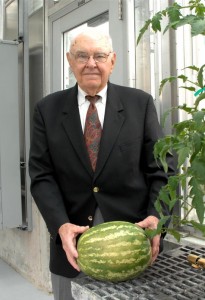
The accomplishments of Kansas State University alumni can be found all around the world—Herbert Diamond invented the snooze button alarm clock, Eugene Rasmusson discovered the El Niño weather cycle and Charlie Hall developed one of the most popular watermelon varieties in the world.
Hall ’60 developed the Crimson Sweet watermelon, which is grown in more than 50 countries and the most popular type of watermelon grown in the United States. It is famous for its smaller seeds, sweeter flavor and increased resistance to plant disease.
Growing up on a small farm in Ark., Hall spent much of his time helping his family grow, harvest and process fruits and vegetables. “I spent a lot of time in the gardens and always like working with plants,” said Hall.
Hall’s interest in plant nutrient requirements, breeding and genetics lead him to enroll at the University of Arkansas after serving in World War II. One of the first courses he took was general botany. “I made an ‘A,’ but more importantly, I enjoyed learning all the botanical terms related to plant growth and development,” said Hall.
Hall began watermelon breeding as a graduate research assistant at the University of Arkansas Fruit Experiment Station. As he and his mentor worked to improve watermelons, they saw one problem—the watermelons did not taste good.
When he came to K-State in 1953 as an assistant professor of horticulture, Hall continued his watermelon breeding research, in addition to teaching and completing his doctoral degree.
After working for 10 years to cross three different varieties, Hall released the Crimson Sweet melon in 1963. “I wanted a melon that was wilt resistant, and I like its general appearance (a striped, refrigerator-sized melon) and its sweetness,” Hall told a reporter from The Village Journal. In addition, he has developed other varieties of watermelon, including All Sweet, Super Sweet and Petite Sweet.
Although Hall left K-State in 1974 to serve as professor and head of the horticulture department at Iowa State University, he left a lasting impact on K-State. During his time at the university, he designed one of the first plant science courses and developed an introductory course in the elements of horticulture. He was a popular horticulture professor, plant science teacher, vegetable specialist and—perhaps most importantly—student mentor.
One of Hall’s former students, Prem Nath, now chairman of Dr. Prem Nath Agricultural Science Foundation, recalls his first summer as a graduate student. “I was assigned to clean and hoe an experimental plot,” said Nath. “I was happy that I did it quite clean and fast. When Professor Hall checked the plots the next day, he was surprised to find the control plot for the experiment on weeds had also been cleared.”
Instead of getting angry that the weed experiment had been ruined, Hall used the experience to teach Nath that hard work and alertness of mind must go together in research.
Another student, Lee Hadwiger, credits Hall for giving him a chance for an “enjoyable and very personally rewarding life as a scientist.” Hall and Hadwiger, professor and scientist of plant pathology at Washington State University, won a national horticulture award for vegetable research together. “Without this opportunity to work with Charlie,” said Hadwiger, “I really would have no career.”
But it was not Hall’s awards and accolades that impressed Hadwiger the most, it was his ingenuity. “When I first reported to his lab he had just laid a concrete floor himself…and was furnishing it with surplus cabinets,” said Hadwiger.
According to Hadwiger, that was just the start of things. Hall and his technician devised almost everything at the farm from scratch. “The chromatography chamber engineered by Hall and his technician allowed me to perform the first amino analysis of watermelons anywhere in the world,” said Hadwiger.
Now retired, Hall spends his time golfing and working in the gardens in his retirement community in Manhattan, Kan. He even teaches members of the community how to grow and harvest vegetables and fruits.
“I guess one who loves teaching never stops sharing their knowledge of a field that they love,” said Hall.
Greetings, Dr. Hall: I enjoyed your vegetable crops course in Waters Hall during the early 1960s. My wife and I now live retired lives in Lincoln, Nebraska, and we both enjoy gardening. We worked as librarians here in Lincoln. I was part of the library staff at the University of Nebraska, and Barbara worked with the Nebraska Game and Parks Commission. Your teaching was useful in my work as science librarian for several departments on both our City and East Campus of the University. I remember your work on Crimson Sweet very well. Thank you for sharing your experiences with us.
Thank you for sharing your experiences at K-State and with Dr. Hall, Richard! I’ll make sure to pass along your kind words to Dr. Hall.